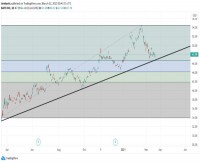|
By: Oscar Decotelli DXA Investments Brazil has gone through it’s worst recession and the corruption scandals have frozen investments into the country. After 3 years, is it time to invest again? Negative news and information have dominated the headlines regarding Brazil for the past several years. The media have focused on various cases of public corruption which are at least partly responsible for the major recession now affecting the overall economy. However, the fundamentals of the Brazilian economy remain sound, and significant opportunities exist for the long term investor to take advantage of uncommonly low entry points. A bit of history Traditionally, investment in Brazil has been a tricky proposition; one fraught with uncertainty. Since the latter part of the twentieth century, public and private leaders have worked to achieve economic and political stability, and thus enhance the international reputation of this sizeable and significant country. In 2002, Brazil elected its first left-leaning/socialist President, when Luis Inacio Lula da Silva was inaugurated on 1 January 2003. This event was followed by a period of momentous economic development from 2003 through 2014- the longest period of positive growth and capital appreciation in Brazilian history. With the resulting reputation of Brazil as an economic and investment darling, knowledgeable leaders and professionals recognized the need for additional significant structural improvements -- efforts which continue to this day. Paramount among these needed enhancements are restructuring the social security system, simplification of the tax laws, and labor and political reform. In 2014, the eyes of the world focused on Brazil as it hosted the World Cup in soccer. Meanwhile, the political and economic base was shaken to its core by a series of landmark events. Brazil entered a new phase as its socio-economic strata realigned and people no longer accepted the “business as usual” mentality. Citizens demanded a “clean” and professional leadership class. This sentiment was embodied in “Operation Carwash,” which began as a minor prosecution of car wash businesses which were used to launder money, and metastasized into the largest corruption investigation and scandal in Brazilian history. To date, an elected President (Dilma Rousseff) has been impeached, more than 2,000 individuals implicated, authorities have arrested and jailed over 200 individuals from every level of society, including billionaires, politicians and other leaders; the last chapter has not been written as prosecutions continue. Between 2015 and 2016 Brazil endured the worst recession in recorded history while the economy contracted by 7 percent in each of those years. However, the bedrock remained solid throughout, and now fundamental measures of economic health have begun to evolve dramatically. From its peak of 10 percent in 2015, inflation has retreated to an annual rate of approximately 3 percent in 2017. Similarly, interest rates which spiked at 14 percent in 2015 are now at 7.5 percent and trending lower. Brazil has begun the arduous but requisite process of structural transformation. The next decade will present innumerable opportunities for advantageous private investment in businesses with sound management and fundamental financial strength. Where we go from here Brazilian businesses provide some of the best risk-return ratios in the world. Enticingly high return multiples on equity and double-digit interest on debt instruments are a reality in the arena of Brazilian investment today. Opportunities should be viewed through the prism of small and medium investment opportunities where local knowledge and expertise is requisite. The Brazilian middle class has many of the same aspirations as those in developed markets and many of the same consumer habits. By focusing on local companies that are well positioned to take advantage of those consumer interests, investors can expect to see multiple expansion and a long runway for future growth. | |
|
This article was published in Opalesque's Private Equity Strategies our monthly research update on the global private equity landscape including all sectors and market caps.
|
Private Equity Strategies
Brazil Bounces Back |
|





 RSS
RSS










